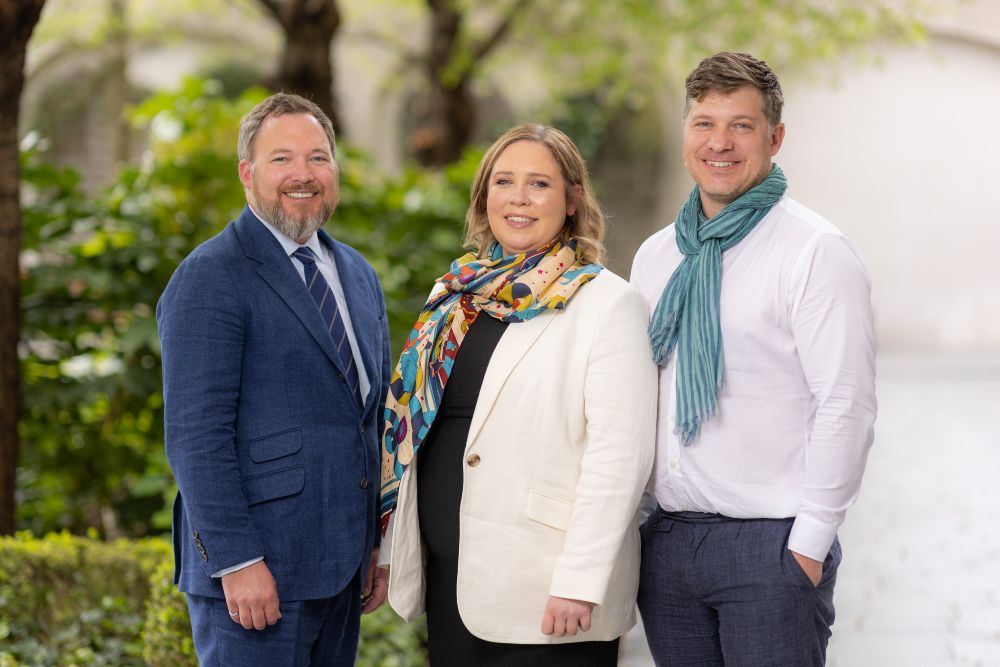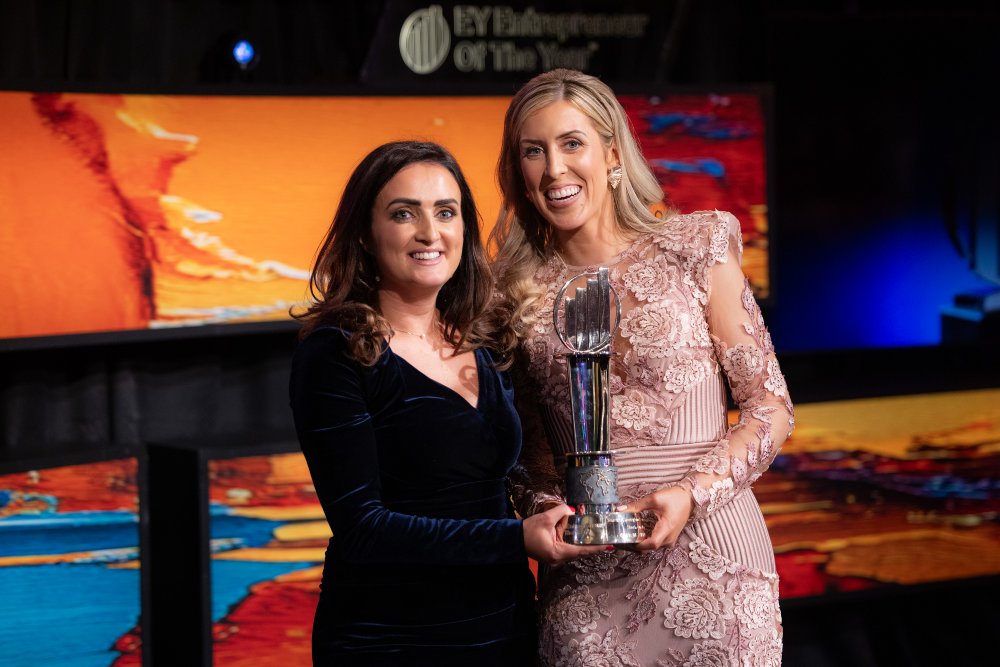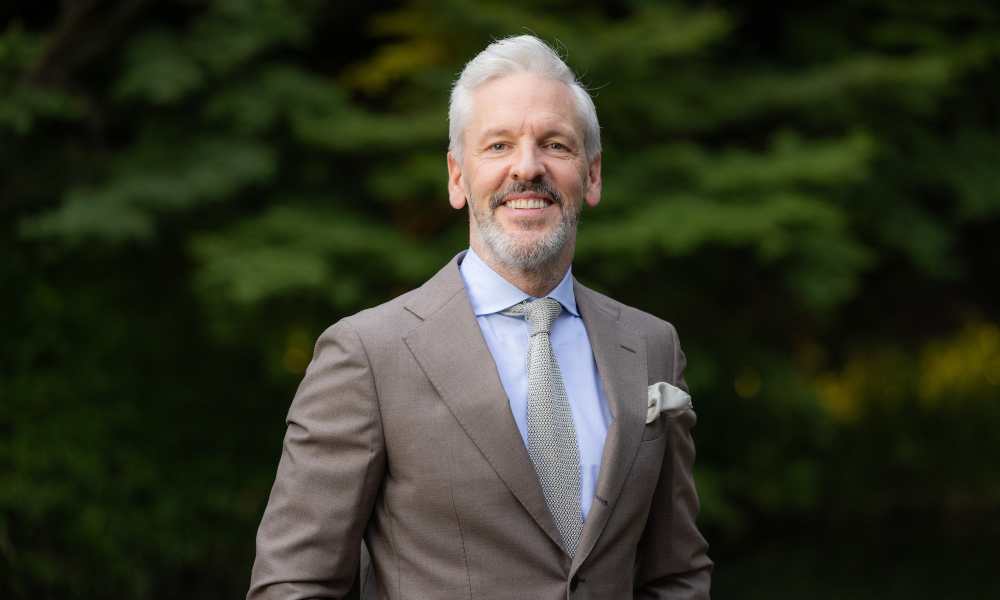Podcast Ep 274: EY Entrepreneur of the Year finalist Liam Dunne, co-founder of Waterford-born business Klearcom, refused to let setbacks deter him. Now he counts Google, MasterCard and Pfizer as customers.
Liam Dunne’s resilience and focus are evident from the get-go. Our conversation covers a lot of ground in a relatively short time and that’s down to the pace of Dunne himself. He’s characteristically all in!
When Dunne and his co-founders Satish Barot and Mark Rohan’s first two start-up ideas collapsed during their time with the NDRC accelerator programme in 2020, he faced the classic entrepreneur’s dilemma: Persist or pivot. But with four children, a mortgage and no salary to fall back on, failure was not an option.
“Regarding the EY Entrepreneur of the Year 2025 programme, it genuinely is a privilege. I remember seeing it on television as a kid thinking ‘Look at what these people are doing.’ To be there now proves anybody can do it – pick the right problem, solve it, have ambition to be a category leader internationally”
In typical Dunne fashion he went out seeking answers and a sliding doors moment came when he spoke with a senior executive heading the global call centre operations of a pharma giant who challenged him.
“When we did the NDRC programme, we were looking at two other ideas initially. First, we wanted to do a WebRTC contact centre application, but we were told the market was too cluttered. Then we planned to build our own voice bot application, but market research showed they would only deal with large providers like Google Dialogflow or Amazon Lex – not a small start-up from Ireland.
“On one of those calls, an absolute gentleman named George Leaderman said something that changed everything. He told us: ‘Everybody is talking to me about who’s the best at delivering conversational AI and speech IVRs, but nobody has given us the ability to test in the wild. Why has nobody given us that capability?”
A business was born
-
You can also listen to the Podcast on:
-
Spotify
-
SoundCloud
-
Apple
Today that business – Klearcom – is operating across 100 countries, counts more than 340 customers and is forecasting a 79% increase in revenue this year.
Klearcom uses AI and machine learning to test interactive voice response (IVR) systems that are used by large businesses to manage incoming calls. The tech detects and resolves telecoms issues before they impact customers. With offices in India and the US, the growth of the business is being driven in part by conversational AI.
“So companies like Google, MasterCard, Visa, and HP use our SaaS platform to create different personas and test that their digital voice is working in each local country across 100 countries,” Dunne explained.
“What that means is, if you’re MasterCard, you can create a Japanese persona that speaks as a female voice with high cadence, low pitch, with background noise because she’s on a train, and test that their conversational AI or generative AI is working in that specific market. This gives them a way to test and benchmark both their AI and human services.”
The fateful conversation with Leaderman in 2020 was a turning point. “We took about six months to build our MVP, then called George and said we’d need six more months to get into 30 countries. George, being the champion he is, said ‘I need 50 countries, and you’ve got three months.’ So we did it, and we got the contract with Pfizer.”
Within two years of that pivot, Klearcom raises €1.5m in funding in an investment led by Furthr VC along with Enterprise Ireland and HBAN’s Bloom Equity syndicate.
“A lot of it was being in the right place at the right time. Digital transformation of voice services was one of the last areas that hadn’t been truly digitally transformed until after Covid. Large language models (LLMs) like ChatGPT put it in a more public-facing setting, but there was already a lot happening. It’s a big risk to digitally transform from human conversation to AI, so companies needed a way to manage that process pre- and post-migration, and ongoing performance and compliance.”
Winning the AI race
While Dunne admits the Holy Grail of his industry is about creating AI platforms indistinguishable from humans, care is needed if businesses are going to actually care for their customers.
“There’s definitely a race happening, but adopting AI just for the sake of it is wrong. You need to look at what problem you’re trying to solve. Right now, the technology isn’t there to fully replace human voice with digital voice – especially in languages other than English where LLMs aren’t trained to the same level of efficacy.
“From the customer’s perspective, there are certain points where they’re happy whether it’s digital or human, and certain points where they prefer digital for menial, repetitive tasks like balance inquiries. But there are scenarios where you need human empathy. If you’re a pharmaceutical company dealing with oncology drugs for very sick individuals, it’s crucial they can speak to an empathetic human regardless of the query.
“Chat bots are a perfect example of getting this wrong. They were created because call costs were expensive, so companies wanted to divert calls to chat. It’s been an absolute disaster for customer experience. That’s using technology to solve a problem, but not solving the right problem.”
Innovating and selling
I asked Dunne how did he balance building the technology while simultaneously winning customers?
“That balance is crucial, and there’s no perfect equilibrium. We’re all from software engineering backgrounds, so we approach everything programmatically. The NDRC program taught us about business models and that there’s no point building a product unless you can get it to market – they’re equally important and symbiotic.
“They emphasised de-risking assumptions in parallel – the more you do simultaneously, the faster the business progresses. We identified the correct problem [on our third attempt], but also looked at the competitive landscape to ensure we could solve it commercially for both the customer and ourselves.
“We did NDRC at the end of 2020, had two failed ideas, but the third time we got lucky thanks to George’s market expertise. Understanding our ideal customer profile was key – we always wanted to deal with multinationals.”
Getting the timely feedback from a senior decision-maker might sound like a lucky break, but in true entrepreneurial fashion Dunne actually made his own luck.
“I’ve learned to be fearless about reaching out. When you genuinely ask for help and say ‘I’m looking to solve a problem in your area and would love feedback considering your experience,’ it’s very rare people say no. You need to be fearless and understand there’s huge reward in speaking to the right people – it helps you de-risk assumptions and understand your research.
“The NDRC accelerator highlighted the importance of speaking to your target market. Don’t be afraid that you’re a startup approaching multinationals – if you solve a prominent enough problem, they’ll want to talk to you and eventually pay for that solution.”
Positive action
Now an EY Entrepreneur of the Year finalist, I posit that it’s remarkable how a business of Klearcom’s scale has been created out of an idea a mere five years ago.
“I haven’t slept,” Dunne fires back. “I haven’t done anything else! But seriously, it’s about the team. We’re all highly motivated. I had no salary, four kids, and a mortgage – after the third swing, it needed to work. That necessity really is the mother of invention, and burning the boats genuinely works.”
This feeds into Klearcom’s approach to winning talent, an aspect of start-up life that often takes second seat to raising capital. “When we hire, culture leads everything. We’re more like a franchise – we’ll give you building blocks to be successful, but if you’re not a self-starter, if you’re not motivated, this environment won’t suit you. We try to put people off initially because culture eats strategy for breakfast. When you work with the right motivated people, you can solve any problem.”
I also observe that Dunne and his co-founders were not your stereotypical college drop-outs or graduates when they started Klearcom. They were all experienced in industry and came to entrepreneurship a little later than most.
“Risk is very personal and depends on your life story. When I was younger, I was involved in other start-ups but wasn’t ready to lead or take all the risk on my shoulders. As I went through life, I became more confident in my abilities. It just happened that later in life, I got tired of doing it for others and wanted to lead from the front – that’s what Klearcom gave me.
“There’s actually research on entrepreneurs over 40, showing they’re more successful than younger ones. Look at Reid Hoffman – he was in his 40s when he started LinkedIn. Age brings perspective and experience.
“I’m the first in my family to start a business and go to college, so maybe I wasn’t in those circles before. Regarding the EY Entrepreneur of the Year 2025 programme, it genuinely is a privilege. I remember seeing it on television as a kid thinking ‘Look at what these people are doing.’ To be there now proves anybody can do it – pick the right problem, solve it, have ambition to be a category leader internationally.
“What I learned in that one week in Japan, I don’t believe you’d learn doing five MBAs. Taking some of the sharpest entrepreneurs from Ireland and having them share openly, helping you avoid pitfalls they encountered – it’s incredible. The bus rides with different entrepreneurs like David Walsh, Harry Hughes, John Purdy, Kevin O’Loughlin – my pen didn’t stop working.
“After spending a week with the EY alumni, I realised I needed to open my eyes further, that the world is bigger and there’s much more we can do. It creates sustainable jobs across Ireland, I can sponsor my local hurling team, and my kids see that giving back to community comes from pushing yourself and taking risk.”
-
Bank of Ireland is welcoming new customers every day – funding investments, working capital and expansions across multiple sectors. To learn more, click here
-
For support in challenging times, click here
-
Listen to the ThinkBusiness Podcast for business insights and inspiration. All episodes are here. You can also listen to the Podcast on:
-
Spotify
-
SoundCloud
-
Apple






